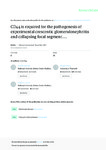CD44 is required for the pathogenesis of experimental crescentic glomerulonephritis and collapsing focal segmental glomerulosclerosis
| dc.contributor.author | Eymael, J | |
| dc.contributor.author | Sharma, S | |
| dc.contributor.author | Loeven, MA | |
| dc.contributor.author | Wetzels, JF | |
| dc.contributor.author | Mooren, F | |
| dc.contributor.author | Florquin, S | |
| dc.contributor.author | Deegens, JK | |
| dc.contributor.author | Willemsen, BK | |
| dc.contributor.author | Sharma, Vikram | |
| dc.contributor.author | van Kuppevelt, TH | |
| dc.contributor.author | Bakker, MA | |
| dc.contributor.author | Ostendorf, T | |
| dc.contributor.author | Moeller, MJ | |
| dc.contributor.author | Dijkman, HB | |
| dc.contributor.author | Smeets, B | |
| dc.contributor.author | van der Vlag, J | |
| dc.date.accessioned | 2018-03-06T11:28:42Z | |
| dc.date.issued | 2018-03 | |
| dc.identifier.issn | 0085-2538 | |
| dc.identifier.issn | 1523-1755 | |
| dc.identifier.uri | http://hdl.handle.net/10026.1/10977 | |
| dc.description.abstract |
© 2017 International Society of Nephrology. A key feature of glomerular diseases such as crescentic glomerulonephritis and focal segmental glomerulosclerosis is the activation, migration and proliferation of parietal epithelial cells. CD44-positive activated parietal epithelial cells have been identified in proliferative cellular lesions in glomerular disease. However, it remains unknown whether CD44-positive parietal epithelial cells contribute to the pathogenesis of scarring glomerular diseases. Here, we evaluated this in experimental crescentic glomerulonephritis and the transgenic anti-Thy1.1 model for collapsing focal segmental glomerulosclerosis in CD44-deficient (cd44-/-) and wild type mice. For both models albuminuria was significantly lower in cd44-/- compared to wild type mice. The number of glomerular Ki67-positive proliferating cells was significantly reduced in cd44-/- compared to wild type mice, which was associated with a reduced number of glomerular lesions in crescentic glomerulonephritis. In collapsing focal segmental glomerulosclerosis, the extracapillary proliferative cellular lesions were smaller in cd44-/- mice, but the number of glomerular lesions was not different compared to wild type mice. For crescentic glomerulonephritis the influx of granulocytes and macrophages into the glomerulus was similar. In vitro, the growth of CD44-deficient murine parietal epithelial cells was reduced compared to wild type parietal epithelial cells, and human parietal epithelial cell migration could be inhibited using antibodies directed against CD44. Thus, CD44-positive proliferating glomerular cells, most likely parietal epithelial cells, are essential in the pathogenesis of scarring glomerular disease. | |
| dc.format.extent | 626-642 | |
| dc.format.medium | Print-Electronic | |
| dc.language | en | |
| dc.language.iso | en | |
| dc.publisher | Elsevier | |
| dc.subject | CD44 | |
| dc.subject | cell migration | |
| dc.subject | collapsing FSGS | |
| dc.subject | crescentic glomerulonephritis | |
| dc.subject | parietal epithelial cells | |
| dc.subject | Albuminuria | |
| dc.subject | Animals | |
| dc.subject | Anti-Glomerular Basement Membrane Disease | |
| dc.subject | Autoantibodies | |
| dc.subject | Cell Movement | |
| dc.subject | Cell Proliferation | |
| dc.subject | Cells, Cultured | |
| dc.subject | Disease Models, Animal | |
| dc.subject | Epithelial Cells | |
| dc.subject | Extracellular Matrix Proteins | |
| dc.subject | Genetic Predisposition to Disease | |
| dc.subject | Glomerulosclerosis, Focal Segmental | |
| dc.subject | Granulocytes | |
| dc.subject | Hyaluronan Receptors | |
| dc.subject | Kidney Glomerulus | |
| dc.subject | Macrophages | |
| dc.subject | Mice, Inbred C57BL | |
| dc.subject | Mice, Knockout | |
| dc.subject | Phenotype | |
| dc.subject | Signal Transduction | |
| dc.subject | Thy-1 Antigens | |
| dc.title | CD44 is required for the pathogenesis of experimental crescentic glomerulonephritis and collapsing focal segmental glomerulosclerosis | |
| dc.type | journal-article | |
| dc.type | Journal Article | |
| dc.type | Research Support, Non-U.S. Gov't | |
| plymouth.author-url | https://www.ncbi.nlm.nih.gov/pubmed/29276101 | |
| plymouth.issue | 3 | |
| plymouth.volume | 93 | |
| plymouth.publication-status | Accepted | |
| plymouth.journal | Kidney International | |
| dc.identifier.doi | 10.1016/j.kint.2017.09.020 | |
| plymouth.organisational-group | /Plymouth | |
| plymouth.organisational-group | /Plymouth/Faculty of Health | |
| plymouth.organisational-group | /Plymouth/Faculty of Health/School of Biomedical Sciences | |
| plymouth.organisational-group | /Plymouth/REF 2021 Researchers by UoA | |
| plymouth.organisational-group | /Plymouth/REF 2021 Researchers by UoA/UoA01 Clinical Medicine | |
| plymouth.organisational-group | /Plymouth/Research Groups | |
| plymouth.organisational-group | /Plymouth/Research Groups/Institute of Translational and Stratified Medicine (ITSMED) | |
| plymouth.organisational-group | /Plymouth/Research Groups/Institute of Translational and Stratified Medicine (ITSMED)/CBR | |
| plymouth.organisational-group | /Plymouth/Users by role | |
| plymouth.organisational-group | /Plymouth/Users by role/Academics | |
| dc.publisher.place | United States | |
| dcterms.dateAccepted | 2017-09-21 | |
| dc.rights.embargodate | 2018-12-21 | |
| dc.identifier.eissn | 1523-1755 | |
| dc.rights.embargoperiod | Not known | |
| rioxxterms.versionofrecord | 10.1016/j.kint.2017.09.020 | |
| rioxxterms.licenseref.uri | http://www.rioxx.net/licenses/all-rights-reserved | |
| rioxxterms.licenseref.startdate | 2018-03 | |
| rioxxterms.type | Journal Article/Review |


